 Petzlover
Petzlover Mountain Cur is originated from United States but Perro de Toro is originated from Spain. Both Mountain Cur and Perro de Toro are having almost same height. Mountain Cur may weigh 13 kg / 28 pounds lesser than Perro de Toro. Both Mountain Cur and Perro de Toro has almost same life span. Both Mountain Cur and Perro de Toro has same litter size. Both Mountain Cur and Perro de Toro requires Low Maintenance.
Mountain Cur is originated from United States but Perro de Toro is originated from Spain. Both Mountain Cur and Perro de Toro are having almost same height. Mountain Cur may weigh 13 kg / 28 pounds lesser than Perro de Toro. Both Mountain Cur and Perro de Toro has almost same life span. Both Mountain Cur and Perro de Toro has same litter size. Both Mountain Cur and Perro de Toro requires Low Maintenance.
 From The United States in the hound group comes the Mountain Cur. This breed was developed especially to “tree” their prey and to trail other smaller game. They treed and bayed larger prey like the wild boar and bears in the mountains and they trailed the smaller ones like the raccoon and squirrel. There are many types of curs and this breed is just one. Curs can be water dogs, farm dogs, hunting dogs and guard dogs. However, they are not great family dogs because they were born to hunt.
From The United States in the hound group comes the Mountain Cur. This breed was developed especially to “tree” their prey and to trail other smaller game. They treed and bayed larger prey like the wild boar and bears in the mountains and they trailed the smaller ones like the raccoon and squirrel. There are many types of curs and this breed is just one. Curs can be water dogs, farm dogs, hunting dogs and guard dogs. However, they are not great family dogs because they were born to hunt.
The Mountain Cur comes out of Kentucky, Tennessee, Ohio and Virginia. The ancestors of the American Mountain Cur came with European settlers almost 200 years ago. They worked with the settlers to hunt for animals that would provide them with pelts and meat in order to survive on the frontier. The breed became rare when the descendants of the settlers moved to the factories after the second world war.
The breed was brought back by four ambitious men who saved the Mountain Cur. They form the Original Mountain Cur Breeder’s Association of OMCBA in 1956. But they argued over the standard and 2 of the 4 left to form their own association: The Stephen Stock Mountain Cur Association. By 1957 the Mountain Cur Breeder’s Association formed but it took until 1998 for the Mountain Cur to be registered with the United Kennel Club.
The Mountain Cur is a tough, courageous dog as are all the Curs. They are willing to face large and ferocious prey. They are fearless watch dogs, using their trait of being quiet on the hunt to their advantage. The Mountain Cur wants nothing more than making you happy. They have been known to corner bears and even bulls. Given the independence and intelligence of the Mountain Cur it is important that the human be the pack leader, or the Cur will assume the role. If angry the Cur will growl and bite, so being the pack leader is vital for humans.
The novel “Old Yeller” was written about a Mountain Cur – a yellow shorthaired dog with a bobbed tail and terrier blood. Like all Mountain Curs “Old Yeller” hunted and treed prey, fought a bear and held onto the nose of a charging bull. The Cur was the first American purebred dog. Other early lines come from the Appalachian Mountains and near them in southern states. Mixing hounds and terriers created this tough, courageous dog whose tenacity and grit are second to none. Today the Mountain Cur has been split into four distinct breeds: the Mountain Cur, The Mountain View Cur, the Stephens Stock, and the Treeing Tennessee Brindle.
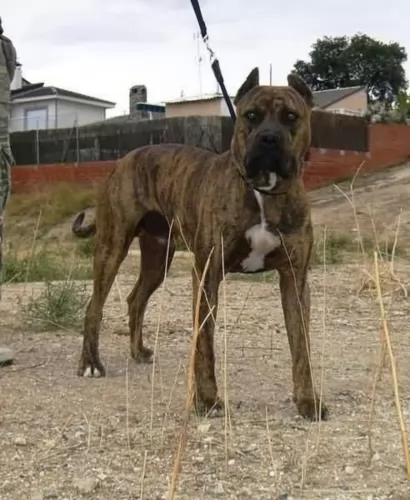 The rare Spanish Perro de Toro seems to have unclear origins, with some saying the dog is a direct descendant of the Toulouse Mastiff, while others say that the dog was developed by crossing the Alano with the Dogue de Bordeaux.
The rare Spanish Perro de Toro seems to have unclear origins, with some saying the dog is a direct descendant of the Toulouse Mastiff, while others say that the dog was developed by crossing the Alano with the Dogue de Bordeaux.
The dog hails from Spain and was once used as a fighting kind of dog but today it is essentially a family pet. The dog is an ancient breed, an ancestor of many of the molosser breeds that are around today.
 Bred to be a hard working hunter and protector, the Mountain Cur is rugged and stocky. They are muscular with strong neck, wide head and expressive dark brown eyes. Some may have blue or green eyes, but they will be darker instead of light. They have a heavy muzzle, high set short ears and feet that are catlike, muscular and strong. The Cur has straight legs, deep chests and 50% are born with the tail bobbed.
Bred to be a hard working hunter and protector, the Mountain Cur is rugged and stocky. They are muscular with strong neck, wide head and expressive dark brown eyes. Some may have blue or green eyes, but they will be darker instead of light. They have a heavy muzzle, high set short ears and feet that are catlike, muscular and strong. The Cur has straight legs, deep chests and 50% are born with the tail bobbed.
Their coat is short and heavy. The colors could be yellow, red, blue, brindle, black and brindle, yellow with white points, dark brown and red.
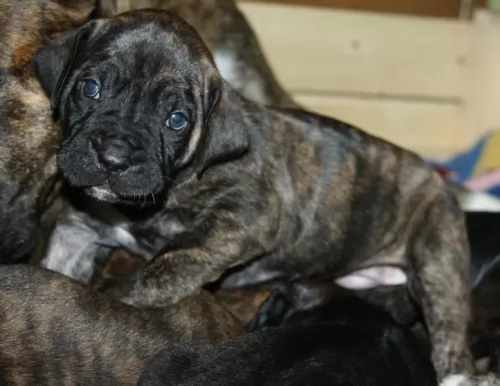 This is a strong, powerful, large breed of dog, making a good watchdog and guardian. He can be anything from 56 to 64cm in height and weigh between 34 and 40kg.
This is a strong, powerful, large breed of dog, making a good watchdog and guardian. He can be anything from 56 to 64cm in height and weigh between 34 and 40kg.
The nose of the dog is broad and black, the ears are set high and droop over slightly,making them floppy ears, but they have always been cropped to stand up erect.
He's a sturdy dog and the tail is fairly thick at the base, tapering to a point. These days it tends to be undocked and left long. The neck is strong and powerful too and the head brachycephalic. The short coat includes colors such as yellow, grey, fawn and red with the black mask.
The Spanish Bulldog looks fairly intimidating and he will certainly need training and socialization if he is to be obedient and well behaved.
He isn’t aggressive but is confident, dominant, fearless, loyal and also loving towards his owner. He is devoted towards his human family and is good with children. Like any mastiff type breed, he will need a firm, kind, consistent, patient owner. This is the kind of owner who will understand this breed type and take time out with him to exercise him and provide him with mental and physical stimulation so as to prevent boredom.
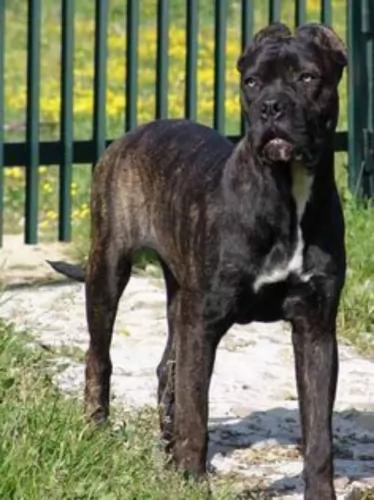 Contrary to what many people think, the temperament of the Perro de Toro is calm and well balanced. This is a reliable, loving, loyal dog who wants to protect his human family.
Contrary to what many people think, the temperament of the Perro de Toro is calm and well balanced. This is a reliable, loving, loyal dog who wants to protect his human family.
He gets on well with children and with pets in the home and when trained and socialized, this intelligent dog is well mannered, obedient and sometimes even submissive.
True, the Perro de Toro has a history of being involved in all kinds of things, from hunting to fighting and also being a working dog, but he is now waiting to show you what a splendid pet he can be if he is raised by the right kind of people.
 There are a few health issues that the Mountain Cur is susceptible to. They include:
There are a few health issues that the Mountain Cur is susceptible to. They include:
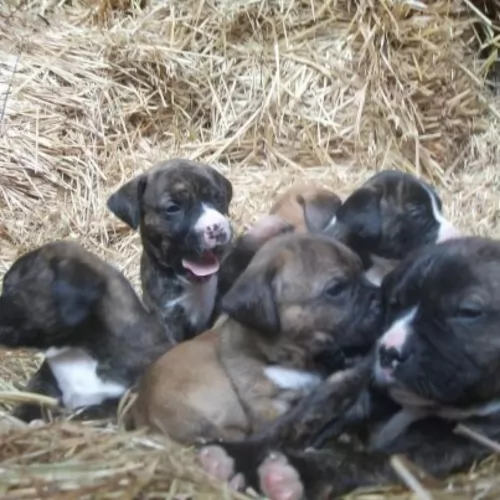 This is a dog breed that is fit and healthy, but to keep him that way you want to make sure he has enough exercise, love and nutritious food.
This is a dog breed that is fit and healthy, but to keep him that way you want to make sure he has enough exercise, love and nutritious food.
He is not known to suffer from any particular disease, but even so, it is wise to be aware of some of the common dog illnesses that your dog could pick up so you can get veterinary help for him just as soon as possible.
With cancer, cells grow rapidly and invade tissue. Dogs can get any of the many cancers there are. Both hereditary and environmental factors can contribute to the development of cancer in canines. Cancer can show up as lumps, swelling, sores that won’t heal, weight loss and difficulty with breathing.
Heartworms are transmitted from one animal to the next by mosquitoes. These worms live in the heart and pulmonary arteries of an infected animal, travelling through the bloodstream and causing havoc. Heartworm is dangerous and can actually be life threatening. Symptoms include coughing, vomiting, battling to breathe and weight loss.
This is a viral disease that can strike terror in anybody who has seen an animal with rabies. It affects the brain and spinal cord of your dog. It is preventable through means of a vaccine. Once symptoms appear, it is a disease which is nearly always fatal.
 Mountain Cure puppies should eat four bowls of high quality dog food in four separate meals each day until 3 months old. From three months to six months feed them 3 times per day and from six months to a year just twice a day.
Mountain Cure puppies should eat four bowls of high quality dog food in four separate meals each day until 3 months old. From three months to six months feed them 3 times per day and from six months to a year just twice a day.
The adult Mountain Cur would eat 3 cups of high quality dog food in one or two meals per day. Don’t overfeed them as they have a tendency toward obesity.
Athleticism
This breed is an active dog and he needs to get plenty of exercise. He needs daily exercise – daily walks – and enjoys canine sports like barn hunt and agility. They do well in field trials.
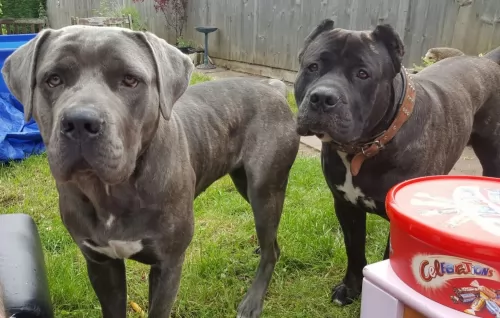 If they are not being used as working dogs, they are family pets, and you need to give them a lot of daily exercise. You will need to give him some walks or hikes and allow him a good run in the country.
If they are not being used as working dogs, they are family pets, and you need to give them a lot of daily exercise. You will need to give him some walks or hikes and allow him a good run in the country.
The Perro de Toro is a short haired dog, and as a moderate shedder, he isn’t going to require too much grooming. A brushing twice a week will help get rid of his hair.
When brushing him, turn it into a bit of a grooming session and check inside his ears, look at his eyes and try to look inside his mouth. He can’t tell you if he has terrible toothache from a rotting tooth and he will rely on you to check his teeth.
Mastiff type dogs need a wholesome diet to remain strong and active. If you are going to feed your pet one of the commercially manufactured dog foods, make sure it is one of the top quality ones.
Avoid the ones that use lots of colorants, preservatives and unhealthy fillers as these can make your dog sick. Try and give him some home-made food which can be added into his dry kibble occasionally.
Boiled chicken, brown rice or pasta and some vegetables such as carrots, sweet potato and spinach chopped up will be excellent for him and will ensure he doesn’t battle with digestive upsets. If you can, every now and then try to include some raw meat for the benefit and health of your pet. Never leave him without a bowl of fresh, cool water.